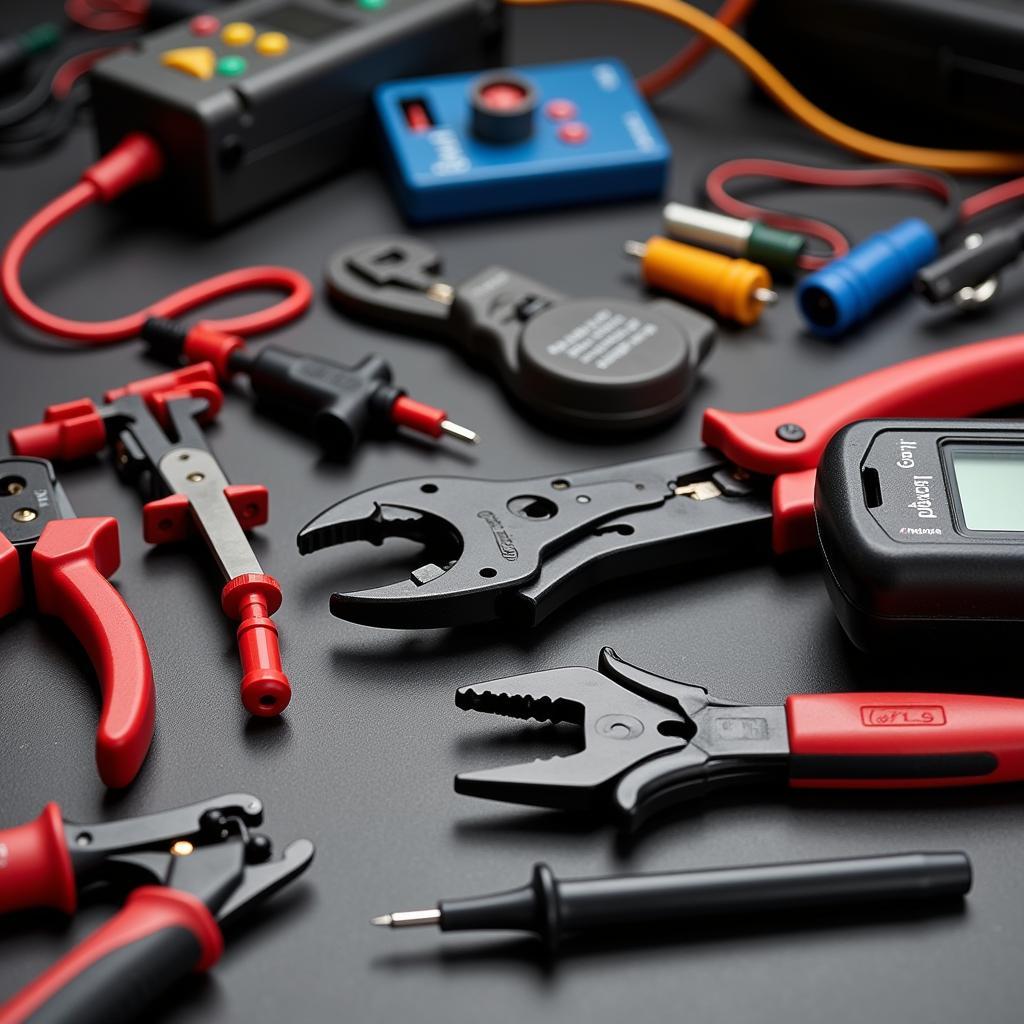Working on car electrical plugs can be intimidating, but with the right tools, it becomes a manageable task. Whether you’re a seasoned mechanic or a DIY enthusiast, having the correct tools for working on car electrical plugs is crucial for both safety and efficiency. This guide will explore the essential tools you need to tackle those electrical gremlins effectively.
 Tools for Working on Car Electrical Connectors
Tools for Working on Car Electrical Connectors
Understanding Car Electrical Plugs and Their Importance
Car electrical plugs, also known as connectors, are the vital links in your vehicle’s electrical system. They facilitate the flow of power and signals to various components, ensuring everything from your headlights to your engine control unit functions correctly. Damaged or corroded plugs can lead to a range of issues, from dim lights to complete system failures. Understanding their function is the first step towards working on them effectively. For other car maintenance tasks, you might want to check out the necessary car tools.
Why the Right Tools Matter
Using the correct tools not only ensures a proper repair but also protects you from potential hazards. Improper tools can damage the plugs, wires, or even cause short circuits, leading to more costly repairs down the line. Choosing the right tools allows for precision, minimizes the risk of damage, and ultimately saves you time and frustration.
Essential Tools for Working on Car Electrical Plugs
Having a well-stocked toolbox is essential for anyone working on car electrical plugs. Here’s a breakdown of the must-have tools:
- Wire Strippers: Essential for removing the insulation from wires without damaging the conductor. Invest in a good quality pair with adjustable stripping gauges for different wire sizes.
- Crimpers: Used to attach terminals to wires securely. A quality crimper will create a tight, reliable connection, preventing loose wires and potential electrical issues.
- Electrical Connector Removal Tools: These specialized tools are designed to release the locking mechanisms of various connector types without causing damage. They come in various shapes and sizes to accommodate different plug designs.
- Multimeter: A multimeter is crucial for diagnosing electrical problems. It can measure voltage, current, and resistance, helping you pinpoint the source of the issue.
- Test Light: A simpler alternative to a multimeter for quickly checking if a circuit is live or grounded.
- Dielectric Grease: This special grease helps protect electrical connections from corrosion and moisture, ensuring long-lasting performance. Apply a small amount to the terminals after completing the repair.
What tools do I need to get started? The tools mentioned above are a great starting point for working on most car electrical plugs. However, specific repairs may require specialized tools.
What if I don’t have the right tools? Investing in the proper tools is crucial for successful and safe car electrical work. Check out our guide on tools needed to work on your car for more information.
Tips for Using Tools Effectively
- Choose the Right Size: Using the correct size wire strippers and crimpers is essential for avoiding damage to the wires and terminals.
- Use Dielectric Grease: Always apply dielectric grease to the terminals after completing a repair to prevent corrosion.
- Inspect Tools Regularly: Make sure your tools are in good condition and replace any worn or damaged parts.
“Investing in high-quality tools for working on car electrical plugs is a worthwhile investment. It not only ensures proper repairs but also prevents further damage and costly fixes down the line,” says Robert Johnson, a seasoned automotive electrician with over 20 years of experience.
Conclusion
Having the right tools for working on car electrical plugs is paramount for successful repairs and maintaining your vehicle’s electrical system. By investing in quality tools and understanding their proper use, you can confidently tackle electrical issues, saving yourself time, money, and frustration. Remember, using the correct tools is crucial not only for the effectiveness of the repair but also for your safety. If you are looking for more general car repair tool information, check out our guide on tools to buy if you want to fix your car.
Do you need a compact set of tools for on-the-go repairs? Check out our recommendations for a portable car tool set.
“A well-maintained tool kit is a mechanic’s best friend, especially when it comes to tackling intricate tasks like working on car electrical plugs. The precision and efficiency these tools offer are indispensable,” adds Sarah Miller, an automotive engineer specializing in electrical systems.
FAQ
- What type of wire strippers should I buy?
- What is the purpose of dielectric grease?
- How do I use a multimeter to test car electrical plugs?
- What are the common types of electrical connector removal tools?
- Where can I find quality tools for working on car electrical plugs?
- What safety precautions should I take when working with car electrical systems?
- What are the signs of a faulty electrical plug?
Need assistance with your car diagnostic needs? Contact us via WhatsApp: +1(641)206-8880, Email: [email protected] or visit us at 910 Cedar Lane, Chicago, IL 60605, USA. Our customer service team is available 24/7 to assist you.

Leave a Reply